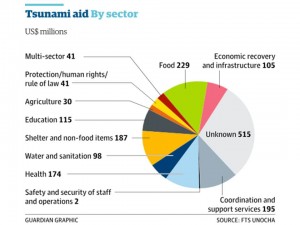Boxing Day, a couple of weeks ago marked the 10th anniversary of the great Asian Tsunami which killed about 250,00 people and made another 2 million or so homeless. The response to this disaster by other countries was impressive and around $6.5bn was given in aid to the affected countries.
To celebrate this, the Guardian wrote a typically limp-wristed piece about all the wonderful things that had been achieved with our $6.5bn. The Guardian also produced a few charts showing how effectively our aid money had been spent. But being possibly excessively cynical, I looked at the Guardian charts and came to quite different conclusions than the Guardian hand-wringer.
Here’s the main chart showing how the first $1.25bn tranche of our money was used:
Woops! Has anyone else noticed that for around $515m of this initial $1.25bn, the aid agencies hadn’t a clue where the money had gone? Well, being a helpful sort of person, perhaps I can assist the Guardian journalist.
1. Indonesia – I’ll start with Indonesia as that’s where the most people died (168,000) and the most were made homeless (500,000) and the country that received the largest amount from the whole $6.5bn. Indonesia got about $1bn. An Indonesian anti-corruption organisation estimated that at least 30% to 40% of Indonesia’s $1bn aid had gone walkabout – mostly into the bank accounts of corrupt politicians, bureaucrats and their business cronies
2. Sri Lanka – next comes Sri Lanka with 35,300 dead, 516,000 people missing and $652m in aid. We don’t have any good figures on how much of the $652m given to Sri Lanka was stolen. But we do have some colourful stories indicating the scale of graft. For example, customs officers in Sri Lanka impounded vehicles and medical supplies we sent to help Sri Lanka�s 516,000 displaced tsunami victims and the families of the country�s 35,300 dead. The corrupt customs officers would reportedly only release the vehicles and aid in return for an immediate payment of around $1m in cash bribes and further payments of another $2m, again in cash. The money was handed over.
Apart from stolen aid money, another issue was theft of land. Many of the Tsunami victims and their families had lived close to the coast for generations. But in some Asian countries whole villages had never had any legal documentation of their ownership of the land on which they lived. In the past this wasn’t a problem. But with the growth of mass tourism, costal land has risen hugely in value. So, when they tried to return to their villages, many thousands found their path blocked by armed guards from local property developers and our reconstruction money probably went into the building of hotels, beach resorts, restaurants and bars.
Another issue is the sheer number of aid agencies involved. Typically after any disaster, between 500 and 1,000 aid agencies will descend on the affected area all with their offices, staff, 4X4 SUVs and so on. As you’ll see from the chart above $195m of the first �1.25bn went on just trying to coordinate the efforts of these many aid groups.
Study after study of foreign aid spending indicates that between 50% and 75% of all foreign aid money to Third World countries gets lost either through incompetence or dishonesty. But those lucratively riding on the foreign aid gravy train choose to avoid mentioning the scale of waste and corruption in case we stop funding their well-paid, jet-setting international lifestyles.















Moved 10 years ago by the appalling natural disaster which killed thousands and deprived many more of their livelihoods, I made a substantial donation to the appeal, believing I was doing my small bit to rebuild the dwellings of humble fishermen and thus restore to them the means of making a living, only to learn some years later that their land had been seized and developed as tourist play-grounds for rich holiday-makers. I resolved then never again to dig deep into my pockets in the belief that I was helping the genuinely deserving.
Charity begins at home – a somewhat pertinent thought when contemplating the current crises throughout the NHS, where retired UK citizens who paid taxes all their working lives cannot get a GP appointment, or following a fall have to wait 11 hours for an ambulance, risking pneumonia, blood clots or worse, while a nurse who chose, in the name of “charity”, to abandon her professional post in England in order to contract Ebola abroad, now occupies an intensive care bed back in the UK at thousands of pounds per day. And yes – I know a lot of folk will shoot me down over this, but I know where I think UK citizens’ priorities should lie.